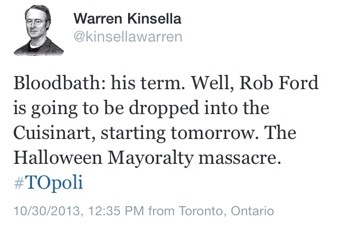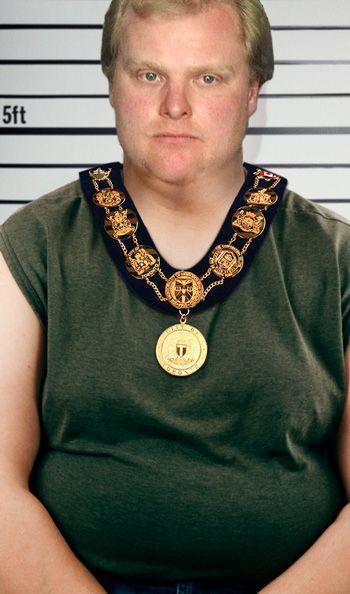Senate scandal: on CBC’s The Current this morn! (Updated)
UPDATE: Done! It’s on in a few minutes. You can listen here. I didn’t slug Gerry, or vice-versa. On it, I continue my quest to defend Nigel Wright. The NDP person talks a lot.
I’ve changed my mind
I’m doing Sunday’s column about what Stephen Harper did to Nigel Wright in the House this afternoon.
I’ve seen some appalling stuff in Ottawa, over the years, but that ranked up there. Disgusting and dishonest.
Metro: Stintz stumbles out of the gate
Quote:
“…Stintz’s announcement was still notable for just how badly she seemed to position her campaign to replace Mayor Rob Ford. Right out of the gate, Stintz seems to have set herself up for failure.”
And:
“I worry that another four years of Rob Ford may not move the city forward,” she added, but the qualifier hardly matters — she may have sealed her fate with that first bit, where she both gave the mayor way more credibility than he deserves and indicated that she won’t have a fiscal agenda all her own.
That’s a big problem for someone who wants to lead the city…”
And:
“…By aligning herself with Ford on fiscal issues, Stintz is asking voters to reject him primarily on the basis of his various scandals. It’s a dangerous strategy, threatening to turn the entire 2014 campaign into a referendum on whether Ford’s headline-grabbers should preclude him from holding office.
That kind of campaign isn’t going to do much good for the city…”
And:
“[Stintz] seems to have charted a different course. A course that apparently starts with “I believe in the fiscal agenda of Rob Ford.” A course that assumes what Toronto really wants is a mayor who’s just like Rob Ford, but a little less so. Good luck getting voters excited about that.”
The full pounding is here. There’s more to come, I expect.
Robocalls: a whole lot of robo-nothing
Every morning, I go on National Newswatch, the best (and most ethical) news aggregator around. Saw my column there, and saw a nothing story about the long-forgotten Robocall saga.
Being an Irish Catholic, and therefore always guilty, it got me thinking. Here I am, today, saying in my Sun column that the Senate scandal could hasten the end of the Harper regime. Haven’t I, you know, predicted their end before?
Well, yes, I have. So did everyone else, too.
The Robocall “scandal” was the Mother Of All Scandals, me and others said. It wasn’t, Conservatives said. It was mainly just the work of one or two guys in one riding, they said.
Who was right? Well, it’s been a couple of years, and the robocall scandal still hasn’t toppled the Harper government. And, I note with reluctance, there have been no arrests of dozens of high-level Conservatives in ridings across Canada.
I plan to write more about this, for Sunday’s paper. But, if I’m being honest with myself, I have to admit this much: the robocall scandal really wasn’t.
I will now go say a few Hail Marys and a Glory Be. God bless.
In Tuesday’s Sun: enjoy your convention, governing Harperites – it could be one of your last
Could Stephen Harper be taken down by the growing Senate scandal?
Sure he could. Of course he could. His poll numbers are dropping, his caucus is rebelling, and his trade-and-economy message is a fading memory. In recent days, he has looked simultaneously enraged and astonished that his authority is slipping away from him.
The fabled Conservative communications discipline is no more. Conservatives are attacking Conservatives, and caucus members are resisting Harper’s agenda. In political strategic terms, PMO is operating like a monkey with a machine gun.
The names of Mike Duffy, Pamela Wallin and Patrick Brazeau – once the stars of the Conservative fundraiser and talking head circuit – are now synonymous with scandal and sleaze, in perpetuity. They know it, and they’ve decided that, if they’re going down, they’re bringing all of their fairweather friends down with them.
Now, it is true that scandal stories get overplayed all the time. The Opposition, and those of us in the media, consider scandal to be far more important than the public does.
Case in point: Toronto mayor Rob Ford. Media report he smokes crack cocaine, he writes letters of reference on official letterhead for convicted criminals (one of them a murderer), and he regularly shows up to work after lunchtime. But, serial scandals notwithstanding, polls suggest his white angry male constituency remains (for now) with him.
Why should anyone think, then, that Harper’s Senate scandal – because it is now indisputably his, whether he was briefed by his senior staff or not – could fell him? Because, mainly, Harper is in the middle of a perfect storm. For some time, he was being buffeted by two storm systems – and then, to make matters appreciably worse, the Duffy-Wallin-Brazeau cyclone hit.
One the one side, Harper was losing support to the same thing that every government eventually faces: he was nearing the ten year mark. After a nearly decade in power, Canadians were wearying of him. His partisans were becoming less loyal – and his detractors had stopped merely disliking him, and were starting to hate him.
On the other side, Justin Trudeau appeared. Conservatives arrogantly and foolishly dismissed Trudeau’s appeal. They did not take seriously, even for a moment, the durability of the Liberal leader’s popularity with older Canadians (who still revere his father) and younger Canadians (who have been seduced by his undeniable charisma).
As Ipsos pollster Darrell Bricker has said to tin-eared Conservatives: “Trudeau is the real deal.” He is young, positive, energetic and progressive – in effect, he is the polar opposite of Stephen Harper. And he arrived when (see above) many Canadians were getting sick of Stephen Harper’s face.
That, then, is why the Senate scandal could indeed hasten the end of the Conservative Party’s time in government. Not because the scandal, in and of itself, is deadly. Because the scandal has come along at precisely the wrong time.
Politics, like comedy, is all about timing. For Stephen Harper’s fading Conservative regime, the timing of the Senate scandal could not possibly be worse.
This kind of thing happens to me often
Toronto needs a mayor. It just does.
Karen Stintz in her own words: read her lips
More, just because some of her backers are already irritating me (my name won’t be on the ballot, morons).
There’s a lot more where this comes from. Link here.






